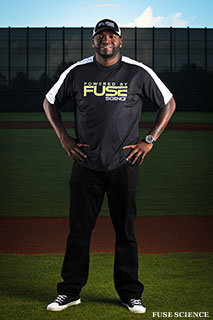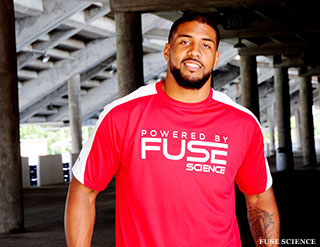Tiger Woods enters this U.S. Open at the Merion Golf Club in Haverford Township, Penn., as the tournament favorite. If he wins, it would be his first major victory since the 2008 U.S. Open at Torrey Pines. At that time, it was a five-year drought that virtually no one could have predicted.

But, as the story goes, a widely publicized infidelity scandal and years of injury and mechanical problems led Woods to the nadir of his career. In November 2011, some three and a half years after that thrilling victory in San Diego, Woods had dropped to the 58th spot in the world.
It was then that Woods announced he was signing a curious new endorsement deal with a little known startup company, Fuse Science.
"To be a part of a company like Fuse, and to know what they have to offer not only to myself but to the general populous and what this technology can do for everyone, it's exciting,” Woods told CNBC at the time. "It's exciting to be on the ground floor."
Even at that point, with other sponsors backing away, it was hard to imagine how a tiny company like Fuse Science could have scored a deal with one of the world's most recognizable athletes.
As it happens, the combination of savvy business and bold innovation that led to Woods' signing has the once-fledgling company on the verge of becoming a bonafide national competitor.
"Our technology," Fuse CEO Brian Tuffin told ThePostGame, "is one that we believe is going to redefine how we all receive medication, nutrition and a series of other different applications."
While Fuse's assertions haven't been verified by independent studies or the FDA, its ability to gain high-profile endorsements has made it a much talked about company in the supplement field.
Adam Adler, the whiz kid co-founder of Fuse, knows a thing or two about risk. A South Florida native, Adler played tennis at South Carolina and professionally for several years before starting a successful poker career. He quickly rose through the poker ranks, even finishing fourth out of 2,000 players at the 2009 World Series of Poker.
Adler says the idea for Fuse came to him as he watched tennis players cramp up during long days of training and marathon matches. Sure, these players could consume an energy drink, but those generally take at least half an hour to kick in. And getting electrolytes through an IV presents obvious challenges.
"You can’t run around the football field or the tennis court with a needle in your arm holding an IV bag,” Adler, now 29, says.
So Adler wanted to create a way for athletes to receive electrolytes instantly, essentially by bypassing the gastrointestinal tract. He worked with a team of top-level researchers and scientists to create a supplement that could be delivered sublingually (under the tongue) or transdermally (through the skin).

In April 2011 the company went public, and some seven months later it announced a partnership with Woods.
The deal with Woods shocked many casual sports fans, most of whom had not heard of Fuse. How could a tiny, unheralded company sign a significant deal with Tiger Woods?
In landing Woods, Adler took advantage of a partnership approach that is becoming more and more common in the sports business realm. Woods signed an equity deal with Fuse, meaning he owns a stake in the company. This idea of equity partnership had gained attention when, several years earlier, Tom Brady and David Wright inked such deals with Under Armour and Vitamin Water, respectively.
All the athletes that have joined Woods at Fuse –- an impressive list that includes Arian Foster, David Ortiz, Jose Bautista, Paul Pierce and Tyson Chandler -- own a stake in the company as well.
Marc Edelman, incoming Associate Professor of Law for Zicklin School of Business at Baruch College, said these equity deals are a natural progression of a parallel hiring trend.
"From a general business context, it's common for somewhat smaller but newer companies to, rather than hiring employees, sign them up as partners to receive equity deals," Professor Edelman says. "It is not surprising to me that the same trend is emerging with respect to endorsements, given that the cost of hiring a premier endorser for a product has become very high and newer businesses would not otherwise have the capital to hire those type of celebrities to endorse a product."

These partnerships bring a certain level of risk, seeing as a contract's value hinges on the ebbs and flows of the company. But the rewards can be spectacular, as Wright learned when Vitamin Water was bought out by Coca-Cola shortly after he signed the partnership. His 0.5 percent stake became worth nearly $20 million.
So when Woods signed with Fuse in 2011, it wasn't only because of the immediate benefits. He was looking toward the future.
"The long-term potential is nearly unlimited,” Woods told ThePostGame in a statement furnished by his representative. "The technology they are working on can significantly and positively affect many lives in energy, nutrition and delivery of medication."
The bright future that appealed to Woods is the same potential that led Tuffin to come aboard around the same time. Tuffin says he wasn't just looking to work on a new energy supplement, rather he had loftier goals for Fuse Science.

"I got involved because this technology has the ability to apply to almost every category that you see at a Walgreens store,” Tuffin says. "That ability to redefine consumer and medical consumption and delivery presents a huge opportunity on a global scale."
While Fuse is perhaps most recognized for its advancements in the athletic sphere, Adler, Tuffin and Co. are not satisfied. They see sublingual and transdermal delivery of medication as a game-changer in the pharmaceutical world. Imagine, Adler says, the ability to deliver insulin or estrogen in a single drop. The ability to take Tylenol out of pill form and deliver it under the tongue. Rather than waiting upwards of half an hour for a headache to subside, people could feel the affects within minutes.
Fuse is a ways away from these developments, but the company has made some progress in pharmaceuticals, recently winning a deal to have its products displayed in Walgreens stores across the country.
Going forward, Adler says he is still seeking out more endorsers, but at this point he is only looking for the "Tiger Woods-level athlete."
"From an athlete's standpoint,” Adler says, "being able to get energy in seconds, all naturally like we do, or being able to get electrolytes in seconds, that's pretty breakthrough in the sports world."




